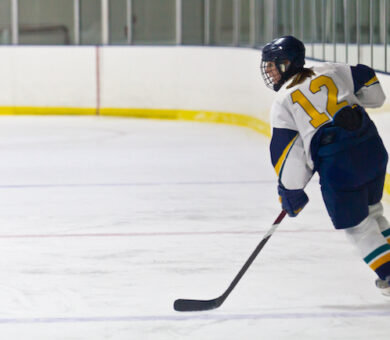Are College Athletes Exhausted? The Daily Schedule Could Be A Challenge
Have you ever thought about how high school and college sports differ? There are major differences that occur that high school athletes are not prepared for when they reach a college campus.
One of them is the time factor. Everything in college takes up more time. You will practice more hours, spend more time on school and homework and have more outside responsibilities, away from sports and school, than you had when you were in high school.
Below is a short list of things you might have to fit into a typical day.
- Breakfast
- Class
- Lunch
- Practice
- Study Hall
- More practice with a coach
- Watching film or sport breakdowns with a coach
- Community Service
- More Class
- Dinner
- Speaking
- Meeting with study groups
- Meeting with professors
- Meeting with academic advisors
- Laundry
- Grocery shopping
- Bookstore to buy supplies
- Extra trips to class to drop off papers or assignments
- Trying to support other athletic teams and friends
- Finding time for a social life
- Trying to get home to see your family
- Making friends outside of your sport
- Getting enough sleep
- Getting things done
- Keeping it fun
It can become stressful and overwhelming.

A Typical Day
What does a normal day look like as a college student athlete? Every day may look slightly different and in-season and out-of-season days will definitely be different, but expect to be busy regardless.
Early start
Usually athletes have early morning workouts (practice or straight conditioning)
Expect an hour or so of straight conditioning. Some folks like to eat before conditioning. Others have to wait until after. Either way, you are usually grabbing something on the run.
Class
Be awake and adherent for class. Expect multiple assignments and chapters with shorter deadlines. This means you have to read more in a shorter amount of time and write papers with less time to research, proof, and finish.
Practice
No matter which sport you play, expect grueling, long, practices where the coach expects your full engagement and buy-in with your full effort. No days off. No days where you can just put in half of an effort.
Extra practice
Most college programs offer (or require) extra time with coaches. These usually consist of extra skill work, extra video watching, goal setting, or just discussing the last practice or competition. Regardless, expect to spend a lot of one-on-one or group time with your coaches.
Team meetings
Throughout the year, expect to have weekly meetings as a team, outside of normal practice time. These meetings consist of scouting reports on the other team, team meals at a coaches house, team goals setting and feedback meetings, weight lifting workouts, or meetings about the upcoming road trips.

Community service
Most colleges will have a healthy community service program, where the team engages with the community.
Lunch and dinner
It is not always easy to find time to eat. You have to plan ahead and figure out when and where to get these meals in. It is important to eat healthy while you train.
Study hall
Expect study halls. Some programs will offer team study halls. Others will offer individual study sessions. Others will allow certain groups to study together. It’s important to know how you study best to get maximum benefit for yourself. Sometimes you won’t have a choice on how you get to study.
Extra academic meetings
Most every college will have some academic guidelines for you to follow. You may have weekly meetings with an advisor on campus or in the athletic department (or both).
You may have extra tutoring that you have to attend. You may have meetings with professors. You might also have to meet with other classmates to work on class projects together, or run to the library, or bookstore, to pick up the required reading materials.
Many of those classmates won’t have the grueling schedule that you have as an athlete.
Daily needs
Your daily needs are things like grocery shopping, laundry, or having to run to Target for home supplies (like toothpaste and soap). It’s extremely hard to fit these things into your busy schedule and oftentimes they build up and get pushed aside.
No matter what level of college you decide to play, expect to be extremely busy and challenged with your time. Expect to be exhausted at times. Expect to feel on your own at times.

The Main Challenges
Due to this extremely busy schedule, many athletes struggle. They are not used to the time demands and the increased academic load.
College students – including student-athletes – are not immune to struggles with mental well-being. About 30 percent of the 195,000 respondents to a recent American College Health Association (ACHA) survey reported having felt depressed in the last 12 months, and 50 percent reported having felt overwhelming anxiety during the same period. – NCAA
Here are some of the main challenges and solutions to help.
Sleep
According to the Sleep Health Research Center at the University of Arizona College of Medicine, student athletes need eight to nine hours of sleep per night to achieve optimal functioning for sport. Research has suggested that 43% of student athletes report getting less than seven hours of sleep per night and 23% report feeling excessive levels of fatigue.
The rigors of college academics and athletics, and for some a work schedule, places large demands of time on student athletes and it is hard to find sleep. Yet sleep is extremely important to obtain optimal performance.
Some things to try:
- Naps during the day – quick naps when you can fit them in
- Two minute breathing exercises
- Keep the phone away from your sleep – don’t take it to bed
- Ear plugs – shut down the noise so you can sleep soundly
- Try to limit procrastination
Eating Right
It’s not alway easy to find healthy food to eat when you are in a hurry. But doing so will help you gain an edge when it comes to keeping up with the daily schedule in college.
Some things to try:
- Pack healthy snacks for your day – avoid processed snacks
- Eat breakfast – get a good start to your day
- Eat carbs – athletes need the fuel of carbohydrates.
- Drink lots of water – athletes need more than the recommended 8 ounces
Finding time for social life
It’s hard to be a student athlete and a person at the same time, but it is critically important to remember you are a person above all else. Find time to make friends and have some responsible fun in college, too.
Some things to try:
- Find ways to meet new people away from sports
- Learn what you are passionate about and feed that passion
- Learn to help the community – great way to engage with people
- Be an advocate for your campus
Family time
Being in college often means getting home less often to see your family. The demands of both academics and athletics fill your calendar. But it is important to keep your family up to date and engaged with you while in college, especially if they are your support.
Some things to try:
- Plan ahead for which holidays you can make it home
- Plan some weekend trips home in your off season
- Plan some weekends where your family members can come to campus
Getting things done
Time management is a huge part of learning how to succeed in college. Planning is important.
Some things to try:
- Plan every week on Sundays so you know which days are more challenging
- Use time between classes to take little things off the list
- Stay away from distractions (phone, email, etc) while working on things
- Take small breaks when you need to
- Be present with what you are doing and who you are with
Remember what fun is
You started playing sports because you had fun playing. As you get older, it becomes more serious and causes more pressure. That doesn’t mean you have to lose the fun.
Some things to try:
- Engage with your team to make practices fun
- Play with your todo list – challenge yourself
- Make friends away from sport so you can take breaks from the pressure
- Sometimes do nothing – take a day off (yes you can)
- Feed your passions outside of sport
Final Thoughts
It takes a strong commitment and good time management to handle the college schedule. Understanding what it looks like is the first step. Choosing the right fit in a college or university is the second.
If you need more help with your college recruiting process or your preparation for college life, let us help you. We know what you need to know and how to be prepared for college life!





